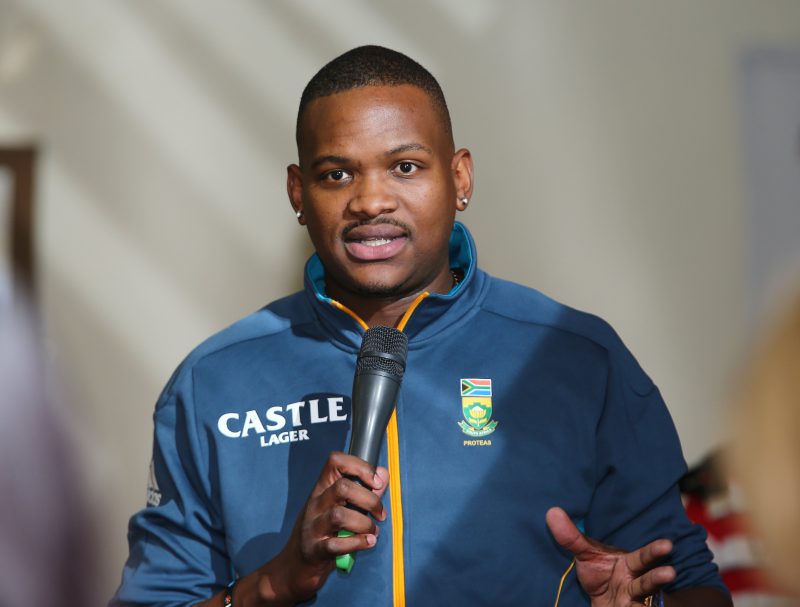The former Proteas seamer has been banned for 8 years for match-fixing. Much of it is his own fault but not all of it...

Lonwabo Tsotsobe. Photo: Richard Huggard/Gallo Images.
It’s a safe bet you’ll find quite a few South African cricket fans with precious little sympathy for Lonwabo Tsotsobe.
The former Proteas left-arm seamer was the last of six provincial cricketers to be banned for franchise cricket’s unsavoury T20 match-fixing scandal of 2015.
Cricket South Africa (CSA) announced on Tuesday evening that he’d been slapped with an eight-year ban.
Also read: Lonwabo Tsotsobe’s fall from grace confirmed with fixing ban
You can hear the parrot cries: “Good riddance!”
And the sad thing about that is that those critics will have a point.
But it’s also an incredibly simplistic way of looking at his fall from grace.
Tsotsobe was undeniably talented.
He took four wickets on his ODI debut against Australia – in the cauldron that is the Waca in Perth – in 2009 and was ranked the top bowler in ODIs in 2012.
However, that talent allowed him to get away with a tardy work ethic.
Tsotsobe will never be remembered as a hard-working cricketer.
The questions over his fitness were pretty much always asked and at times he looked patently overweight.
Some observers mentioned with much enthusiasm what a world-class bowler Tsotsobe could’ve become if he bowled 5km/h quicker.
With proper conditioning, he certainly could’ve but the fact that he actually never seemed to try was revealing.
It extended to other aspects of his game too.
In 2011, Tsotsobe was notably recruited as English county Essex’s overseas pro for the first part of their domestic season.
Their arrangement was ended a week before it was supposed to.
Tsotsobe took five wickets at an average of 77 and was eventually relegated to the county’s second team.
He then decided to voice his anger on Twitter stating: “Ive never felt like ths eva. Ths is the worst two mnths of my life. (T)alent is over rated,its the hard work u put wt talent that gets u places. And its just impossible to work in ths environment.”
Essex, quite rightly, complained over his “unprofessional” conduct.
At the time it seemed like a blip on the radar but over the years Essex were vindicated.
There were times when Tsotsobe would simply “disappear” when his two franchises the Warriors and Lions were playing four-day cricket.
He simply didn’t want to, ostensibly because of the physical demands.
Ironically, when Tsotsobe was politely “forced” to, he did quite well.
But the man from Port Elizabeth simply didn’t have it in him to change his ways.
His whole Proteas career attested to a man who simply rode on his talent and his social media pages – particularly Instagram – testified of a man enjoying the material things in life.
It caught up with him.
“I wish to apologise to cricket lovers all over the world,” Tsotsobe said in a statement on Tuesday.
“I was, at the time, in a very vulnerable financial state and this dilemma too easily persuaded me to participate in spot fixing. There are no words to describe the regret I have in relation to my actions.”
Yet before Tsotsobe is lambasted for being a prime candidate for the “easy” way to quick buck, South African cricket needs to acknowledge its share.
Tsotsobe was undoubtedly indulged by administrators, predominantly because of transformation demands.
Before 2013’s tour to Sri Lanka, he was selected without actually being fit.
It took administrative interference to approve his spot on the plane.
It also explains why they were satisfied with his spurts of brilliance but never tried all too hard to make him a great.
This is a man who needed guidance.
And we also need to realise that the politics of our sport played a role.
Black players like Tsotsobe are put on the pedestal of “change” when they can make the Proteas’ brand look good and representative.
But when things go pear-shaped, they have to fend for themselves.
It can’t be a coincidence that four of the six banned players were black … and undoubtedly disillusioned.
For more sport your way, follow The Citizen on Facebook and Twitter.
Download our app